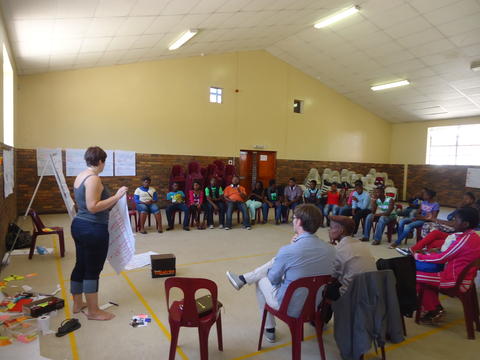

The weekend consisted of planning for 2013 as well as an election to choose the new branch committee as well as choosing the different heads of the different portfolios. Present were more than 30 learners from different grades and tutors and they all had a chance to discuss the decision making, planning and electing the branch committee.
The Main goal of our SPW was to elect a branch committee (in charge of roles and portfolios) and for new volunteers (grade12 from last year returning) to take ownership of programme and become part of the management team. It was also a great weekend for the leaner reps and tutors to get to know each other better.
On Saturday we discussed the year program and we also had a look back at what happened in 2012. The morning started off with an introduction and the group explaining what their expectations of the weekend will be, we then discussed what happened in 2012 and then we ended with looking at what IkamvaYouth is doing well, what challenges we are facing, what IkamvaYouth is offering learners and the community and what we can do to improve the programme. We had a lot of first time branch committee members, but the rest of the group made them all feel included and welcome.
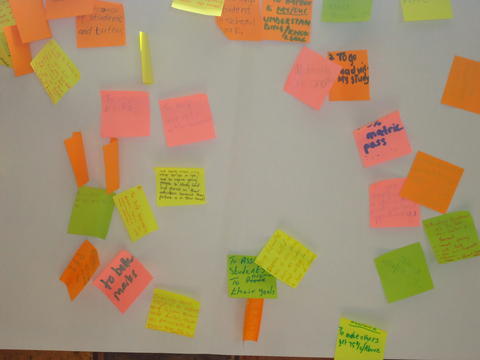
On Sunday the election took place and everyone had a chance to vote for the different nominees. The nomination and election process were very democratic and the nominees had to explain to the group why they were best suited for the different portfolios. The different portfolios were Tutoring, Volunteer Coordination, Career Guidance, Media, Image and Expression, Computer Literacy, Health and Life Skills and Alumni.
The different portfolio members also had to discuss their portfolios and present a plan of action for the group and will need to present this plan of action to all the Ikamvanites at Makhaza. They had to present their goals, when the goals should be reached and by whom. Emihle, a grade 8 learner and newly appointed portfolio member said that the weekend was a dream come true and that she enjoyed the interaction and discussions that took place and that she is really happy and proud for being chosen as part of the health and life skills portfolio.

Mandisi Gladile, a tutor says, “the weekend was really informative and made me realise the value IkamvaYouth adds not only to the learners but also the community and I feel really inspired for the things that we have planned for 2013.”
strategic_planning_week_2013.pdf
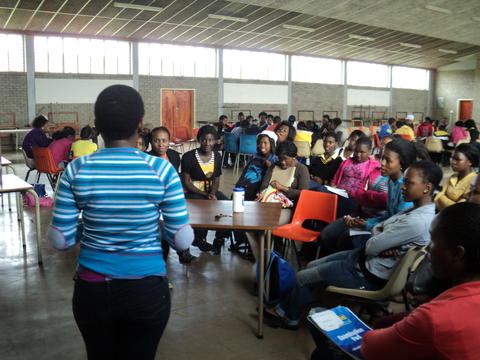
On the morning of the 16th of February IkamvaYouth; practically; began the process of changing lives. As hordes of excited learners trooped into the hall there was a tangible sense of expectation in the air; the stakes are high; we had a brilliant Open Day and now it’s time to deliver.
One cannot help but be humbled by the commitment levels of the schools; parents and learners. The Nombulelo Senior Secondary School principal left the comfort of his home on a Saturday morning to make sure that the school hall was ready for our use. The Ntsika Senior Secondary School principal continues to transport the learners in a taxi to make sure they are not late for sessions. Learners from Khutliso Daniels Senior Secondary School know that the principal has taken a very active interest in their progress while they are in our programme and this gives them that extra push. It is indeed the beginnings of greatness for the learners in this Joza Township of Grahamstown. IkamvaYouth is in operation.
This would not be possible without the selfless involvement of our volunteer tutors. From both Rhodes University and the township community they came; responding to a call of helping youth succeed by fully utilising education as a tool for success. We look forward to a year of exceeding expectations!!!


IkamvaYouth continues to grow; a new branch has been established in Ikageng Township, Potchefstroom, in the North West. This branch has been honoured with an Orange IkamvaYouth logo, a warm and inviting colour, the colour associated with the gentle warmth of the sun.
Our new Branch Coordinator, Zanele Mdletye is putting the IkamvaYouth print in the North West. We are pleased to announce that ground work in establishing a new branch in Ikageng has begun! IkamvaYouth has since received a warm welcome from the community of Ikageng. Four schools are on board with the programme, learner recruitment forms have been issued. The learner response has been awesome. We are on the verge of securing office space as well as tutoring venue, negotiations are in progress.
The North West University, Potchefstroom Campus recently gave us a platform to recruit for tutors. We are still navigating our way with Vuselela College and Agricultural College. Our mission is to recruit a dedicated army of volunteers to start tutoring learners by the end of February.
We are looking forward to working together with the community of Ikageng to achieve better results.
Those inspired by Orange are always on the go! Watch this space.
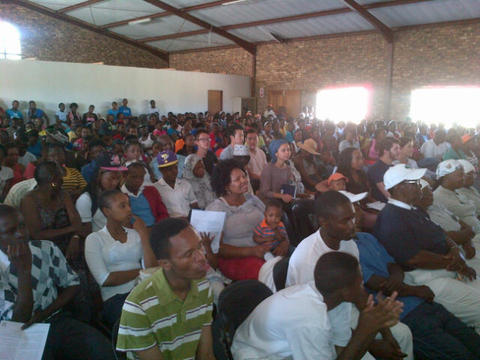
Saturday the 26th of January 2013 was a very special day for IkamvaYouth Gauteng as we opened our doors to new applications for the year. Open Day for both branches in Gauteng were jointly held at Ebony Park and it was exciting to see over 600 learners in attendance. The new applicants were all eager to see what IkamvaYouth had to offer and how they would be assisted to improve their marks.

The day started off with the District Coordinator, Patrick Mashanda, explaining what IkamvaYouth was all about and how IkamvaYouth would assist the learners within the community. Many of our supporters including ABI, Tzu Chi Foundation, Advtech, Mindset Network, ERM, EOH, Thoughtworks were present cheering all the learners on to take responsibility for their future and improve their marks.
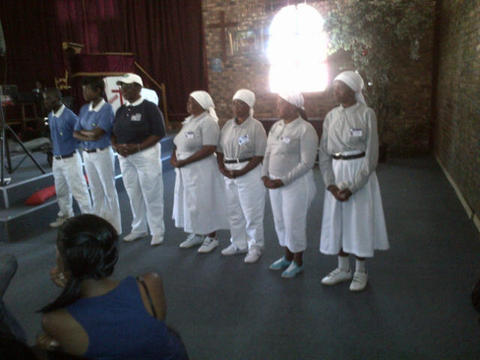
(The Tzu Chi Foundation Team)
A prize giving ceremony immediately followed and all learners with over 80% attendance for 2012 were awarded certificates of achievement and the Grade 12’s with distinctions were recognised. Ntebaleng Morake, a Grade 12 with 4 distinctions, said a few words to thank everyone who supports IkamvaYouth and also encouraged learners to know that they too could excel at school.
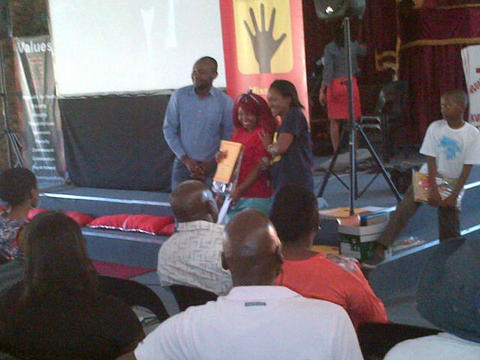
(Ntebaleng Morake receiving her award)
Loads of fun ended the day off with donations of cokes, a DJ and music from ABI and pies from King Pie.
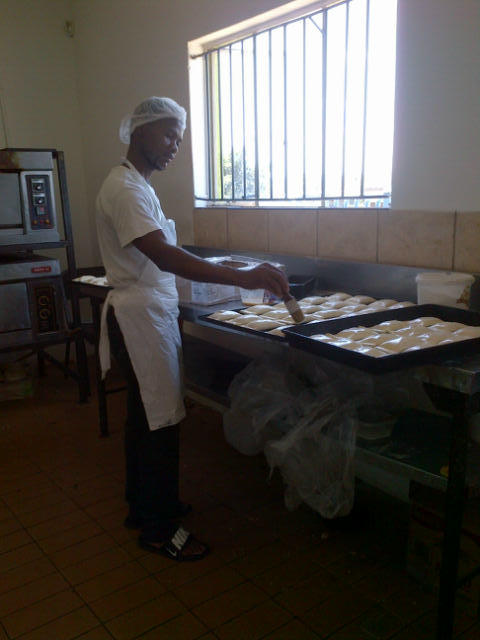
(Pies from King Pie being prepared for the aspiring Ikamvanites)
We are ready to change some lives this year, are you?
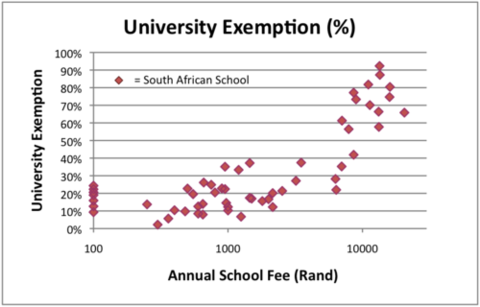
Just over a year ago I was approached by Andrew Einhorn, a UCT grad student, who was interested in implementing an online maths program at Makhaza. All he needed was access to the lab, access to a class and a tutor. A year down the line not only he has completely revamped two of our branches labs in Makhaza and Nyanga, established a formal Khan Academy program in these branches (as well as other locations in Cape Town and rural Eastern Cape), but has produced results at very low costs, and is piloting in schools for 2013.
His passion for creating high impact and stimulating learning environments in township and rural locations often only privy to the wealthy few has seen him start Numeric, an NGO interested in finding ways to bring Khan Academy to South Africa and make it a useful resource to both teachers and learners. He presented an inspiring TEDxUCT talk last year outlining the background, as well as the impact and results Numeric has had. He also posted the following blog on the Khan Academy website:

A little over 15 months ago, we started an experiment. We wanted to know if Khan Academy was viable in township (slum) areas in South Africa and if so, what type of impact it might have on numeracy. Numeracy in South Africa is astonishingly weak, with just 2% of Grade 9s scoring over 50% on the annual national assessments in 2012.
And so we set out to see if Khan Academy might be used as a catalyst for change. But before I expound on the results of this experiment, I ought perhaps give a little more background on the environments we’re working in.
Townships in South Africa are not unlike the favelas of Brazil or the slums bordering Delhi and Calcutta in India. They are urban areas that were, until the end of Apartheid in 1994, reserved for non-whites, but have now become residential hubs for the urbanizing masses. They are typically built on the periphery of cities and tend to be characterized by high population density, poverty and unemployment. Picture a ramshackle of makeshift houses constructed out of corrugated iron, wood scraps and cardboard, jigsawed together into a gigantic maze 5 miles wide and 10 miles across. At the risk of generalising grossly, that’s more or less the picture I want you to have in mind as you read this article.
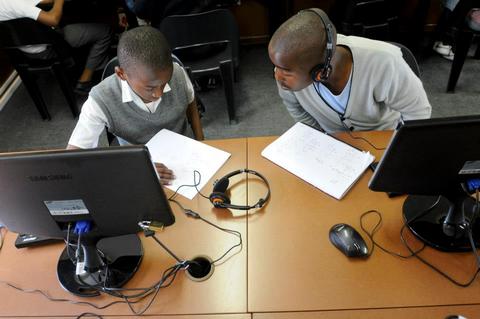
Now, townships in South Africa get a bad rap. They are viewed as ‘dangerous’ places and it is considered unwise to visit them unless you know someone there, or visit them as part of a ‘township tour’. Yet while crime rates in these areas are often high, the reputation does not do justice to the vibrant and persevering people who inhabit them. In particular, townships are YOUNG! On any given day, around two o’clock in the afternoon, the streets flood with uniformed, backpack-toting children on their way home from school. And despite having barely two pennies to rub together, they are meticulously dressed – shiny black shoes, starched white collars – and have aspirations to match. Most of the children in South Africa live in some form of township, which means that children growing up in these environments constitute the better part of the future of our country.
And yet it is supremely difficult to convince our best teachers to go and work in these areas. They are offered good jobs in well-resourced schools most often located in the wealthy suburbs of the cities. Principals at these schools compete fiercely for their skills. And this is as it should be. But it also entrenches the educational bias whereby a child’s access to quality education is directly proportional to the wealth of their family (see chart below).

* University exemption rate refers to the percentage of learners who attain the academic marks in their final year of school that are necessary to gain access to South African universities.
So Numeric’s experiment was to see whether we could use Khan Academy, in conjunction with a slightly less skilled (and often unqualified) math coach, to create the high impact and stimulating learning environments enjoyed by kids living in wealthier suburbs.
The opportunity provided by Khan Academy premised on the following: Videos do not argue about where they are played; they are unaffected by crime and environment. Appropriately licensed, they do not cost anything. They do not grow weary, skip class, or grow jaded. Instead, they convey their message enthusiastically, faithfully, clearly – time and time again. A child may watch just as many videos as he/she has appetite for, and need never feel limited by the dragging on of a boring class or an inept teacher. For many children in South Africa, a Khan Academy video will be their first exposure to what we might term ‘world class instruction’. When complemented by the exercises on the Knowledge Map, Khan Academy becomes a powerful tool for turning the tide on numeracy in South Africa.
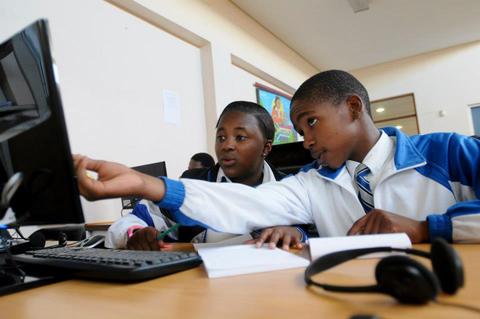
So what were the results of the experiment? Well, it’s probably too early to draw any major conclusions, but we do have a few figures we’d like to share. We currently run 7 Khan Academy classes across 3 different hubs in the Eastern and Western Cape provinces of South Africa. The first pilot group of 20 Grade 9s has just completed its first twelve months of Khan Academy and their numbers are as follows:
* Total Khan Academy hours delivered: 2220
* Total Problems Solved: 27,988
* Total Problems per learner: 1399
* Total Khan Modules Complete: 1232
* Average Modules per learner: 62
Bearing in mind this is an afterschool programme, these are 27,988 math problems that would not otherwise have been attempted. The 62 modules completed by the average learner constitute 62 gaps that those learners have filled. But it’s more about just the numbers; it’s about creating excitement and enthusiasm around learning. This is hard to convey in words, but perhaps a picture will suffice.

As we always say to our coaches, the tragedy in South Africa is not so much that kids don’t want to learn. It’s that some kids DO want to learn, but can’t. Khan Academy provides us one way to give these kids a world-class education without having to magically replenish our nation’s supply of teachers. And who knows, perhaps one day these kids will become the inspirational and talented teachers we have waited for for so long!
—-
Andrew Einhorn is the founder and current CEO of Numeric.org. His TEDx talk on Numeric.org and Khan Academy is available here.
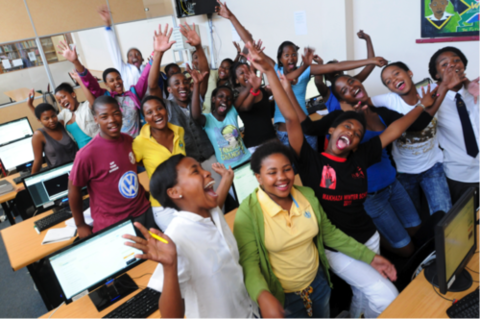
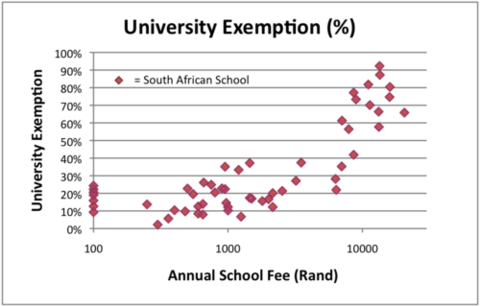
Just over a year ago I was approached by Andrew Einhorn, a UCT grad student, who was interested in implementing an online maths program at Makhaza. All he needed was access to the lab, access to a class and a tutor. A year down the line not only he has completely revamped two of our branches labs in Makhaza and Nyanga, established a formal Khan Academy program in these branches (as well as other locations in Cape Town and rural Eastern Cape), but has produced results at very low costs, and is piloting in schools for 2013.
His passion for creating high impact and stimulating learning environments in township and rural locations often only privy to the wealthy few has seen him start Numeric, an NGO interested in finding ways to bring Khan Academy to South Africa and make it a useful resource to both teachers and learners. He presented an inspiring TEDxUCT talk last year outlining the background, as well as the impact and results Numeric has had. He also posted the following blog on the Khan Academy website:

A little over 15 months ago, we started an experiment. We wanted to know if Khan Academy was viable in township (slum) areas in South Africa and if so, what type of impact it might have on numeracy. Numeracy in South Africa is astonishingly weak, with just 2% of Grade 9s scoring over 50% on the annual national assessments in 2012.
And so we set out to see if Khan Academy might be used as a catalyst for change. But before I expound on the results of this experiment, I ought perhaps give a little more background on the environments we’re working in.
Townships in South Africa are not unlike the favelas of Brazil or the slums bordering Delhi and Calcutta in India. They are urban areas that were, until the end of Apartheid in 1994, reserved for non-whites, but have now become residential hubs for the urbanizing masses. They are typically built on the periphery of cities and tend to be characterized by high population density, poverty and unemployment. Picture a ramshackle of makeshift houses constructed out of corrugated iron, wood scraps and cardboard, jigsawed together into a gigantic maze 5 miles wide and 10 miles across. At the risk of generalising grossly, that’s more or less the picture I want you to have in mind as you read this article.

Now, townships in South Africa get a bad rap. They are viewed as ‘dangerous’ places and it is considered unwise to visit them unless you know someone there, or visit them as part of a ‘township tour’. Yet while crime rates in these areas are often high, the reputation does not do justice to the vibrant and persevering people who inhabit them. In particular, townships are YOUNG! On any given day, around two o’clock in the afternoon, the streets flood with uniformed, backpack-toting children on their way home from school. And despite having barely two pennies to rub together, they are meticulously dressed – shiny black shoes, starched white collars – and have aspirations to match. Most of the children in South Africa live in some form of township, which means that children growing up in these environments constitute the better part of the future of our country.
And yet it is supremely difficult to convince our best teachers to go and work in these areas. They are offered good jobs in well-resourced schools most often located in the wealthy suburbs of the cities. Principals at these schools compete fiercely for their skills. And this is as it should be. But it also entrenches the educational bias whereby a child’s access to quality education is directly proportional to the wealth of their family (see chart below).

* University exemption rate refers to the percentage of learners who attain the academic marks in their final year of school that are necessary to gain access to South African universities.
So Numeric’s experiment was to see whether we could use Khan Academy, in conjunction with a slightly less skilled (and often unqualified) math coach, to create the high impact and stimulating learning environments enjoyed by kids living in wealthier suburbs.
The opportunity provided by Khan Academy premised on the following: Videos do not argue about where they are played; they are unaffected by crime and environment. Appropriately licensed, they do not cost anything. They do not grow weary, skip class, or grow jaded. Instead, they convey their message enthusiastically, faithfully, clearly – time and time again. A child may watch just as many videos as he/she has appetite for, and need never feel limited by the dragging on of a boring class or an inept teacher. For many children in South Africa, a Khan Academy video will be their first exposure to what we might term ‘world class instruction’. When complemented by the exercises on the Knowledge Map, Khan Academy becomes a powerful tool for turning the tide on numeracy in South Africa.

So what were the results of the experiment? Well, it’s probably too early to draw any major conclusions, but we do have a few figures we’d like to share. We currently run 7 Khan Academy classes across 3 different hubs in the Eastern and Western Cape provinces of South Africa. The first pilot group of 20 Grade 9s has just completed its first twelve months of Khan Academy and their numbers are as follows:
* Total Khan Academy hours delivered: 2220
* Total Problems Solved: 27,988
* Total Problems per learner: 1399
* Total Khan Modules Complete: 1232
* Average Modules per learner: 62
Bearing in mind this is an afterschool programme, these are 27,988 math problems that would not otherwise have been attempted. The 62 modules completed by the average learner constitute 62 gaps that those learners have filled. But it’s more about just the numbers; it’s about creating excitement and enthusiasm around learning. This is hard to convey in words, but perhaps a picture will suffice.

As we always say to our coaches, the tragedy in South Africa is not so much that kids don’t want to learn. It’s that some kids DO want to learn, but can’t. Khan Academy provides us one way to give these kids a world-class education without having to magically replenish our nation’s supply of teachers. And who knows, perhaps one day these kids will become the inspirational and talented teachers we have waited for for so long!
—-
Andrew Einhorn is the founder and current CEO of Numeric.org. His TEDx talk on Numeric.org and Khan Academy is available here.




















 Lloyd Lungu
Lloyd Lungu